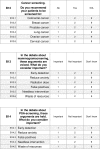Do you recommend cancer screening to your patients? A cross-sectional study of Norwegian doctors
- PMID: 31473617
- PMCID: PMC6720551
- DOI: 10.1136/bmjopen-2019-029739
Do you recommend cancer screening to your patients? A cross-sectional study of Norwegian doctors
Abstract
Objective: Guidelines for cancer screening have been debated and are followed to varying degrees. We wanted to study whether and why doctors recommend disease-specific cancer screening to their patients.
Design: Our cross-sectional survey used a postal questionnaire. The data were examined with descriptive methods and binary logistic regression.
Setting: We surveyed doctors working in all health services.
Participants: Our participants comprised a representative sample of Norwegian doctors in 2014/2015.
Primary and secondary outcome measures: The primary outcome is whether doctors reported recommending their patients get screening for cancers of the breast, colorectum, lung, prostate, cervix and ovaries. We examined doctors' characteristics predicting adherence to the guidelines, including gender, age, and work in specialist or general practice. The secondary outcomes are reasons given for recommending or not recommending screening for breast and prostate cancer.
Results: Our response rate was 75% (1158 of 1545). 94% recommended screening for cervical cancer, 89% for breast cancer (both established as national programmes), 42% for colorectal cancer (upcoming national programme), 41% for prostate cancer, 21% for ovarian cancer and 17% for lung cancer (not recommended by health authorities). General practitioners (GPs) adhered to guidelines more than other doctors. Early detection was the most frequent reason for recommending screening; false positives and needless intervention were the most frequent reasons for not recommending it.
Conclusions: A large majority of doctors claimed that they recommended cancer screening in accordance with national guidelines. Among doctors recommending screening contrary to the guidelines, GPs did so to a lesser degree than other specialties. Different expectations of doctors' roles could be a possible explanation for the variations in practice and justifications. The effectiveness of governing instruments, such as guidelines, incentives or reporting measures, can depend on which professional role(s) a doctor is loyal to, and policymakers should be aware of these different roles in clinical governance.
Keywords: Cancer screening; Doctors' roles; Gatekeeping; Norway.
© Author(s) (or their employer(s)) 2019. Re-use permitted under CC BY-NC. No commercial re-use. See rights and permissions. Published by BMJ.
Conflict of interest statement
Competing interests: None declared.
Figures
References
-
- Norway, T.R.C.o Research-based evaluation of the Norwegian breast cancer screening program, 2015. Final report.
-
- Sætnan AR. To screen or not to screen? science discourse in two health policy controversies, as seen through three approaches to the citation evidence. Scientometrics 2000;48:307–44. 10.1023/A:1005636420708 - DOI
MeSH terms
LinkOut - more resources
Full Text Sources


